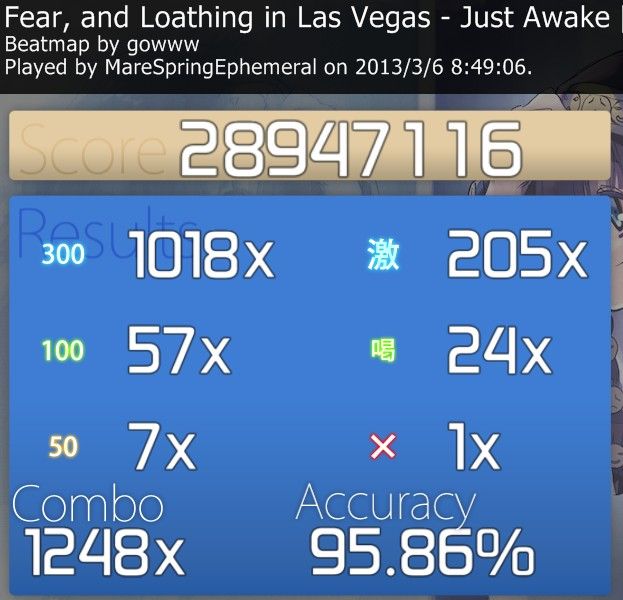ZOJ3712:Hard to Play
MightyHorse is playing a music game called osu!.

After playing for several months, MightyHorse discovered the way of calculating score in osu!:
1. While playing osu!, player need to click some circles following the rhythm. Each time a player clicks, it will have three different points: 300, 100 and 50, deciding by how clicking timing fits the music.
2. Calculating the score is quite simple. Each time player clicks and gets P points, the total score will add P, which should be calculated according to following formula:
P = Point * (Combo * 2 + 1)Here Point is the point the player gets (300, 100 or 50) and Combo is the number of consecutive circles the player gets points previously - That means if the player doesn't miss any circle and clicks the ith circle, Comboshould be i - 1.
Recently MightyHorse meets a high-end osu! player. After watching his replay, MightyHorse finds that the game is very hard to play. But he is more interested in another problem: What's the maximum and minimum total score a player can get if he only knows the number of 300, 100 and 50 points the player gets in one play?
As the high-end player plays so well, we can assume that he won't miss any circle while playing osu!; Thus he can get at least 50 point for a circle.
Input
There are multiple test cases.
The first line of input is an integer T (1 ≤ T ≤ 100), indicating the number of test cases.
For each test case, there is only one line contains three integers: A (0 ≤ A ≤ 500) - the number of 300 point he gets, B (0 ≤ B ≤ 500) - the number of 100 point he gets and C (0 ≤ C ≤ 500) - the number of 50 point he gets.
Output
For each test case, output a line contains two integers, describing the minimum and maximum total score the player can get.
Sample Input
1 2 1 1
Sample Output
2050 3950
题意:一共有三种数字300,100,50,每个样例中给出数字的个数,公式是P = Point * (Combo * 2 + 1),其中combo是这个数是第几个计算的,
结果中的两个,一个是从左到右计算,另一个是从又到左计算
#include <stdio.h> #include <string.h> int main() { int t; int a[4] = {300,100,50}; int i,v[4],sum,x,cas; scanf("%d",&t); while(t--) { scanf("%d%d%d",&v[0],&v[1],&v[2]); x = 1; sum = 0; for(i = 0; i<3; i++) { cas = v[i]; while(cas--) { sum+=a[i]*((x-1)*2+1); x++; } } printf("%d ",sum); x = 1; sum = 0; for(i = 2; i>=0; i--) { cas = v[i]; while(cas--) { sum+=a[i]*((x-1)*2+1); x++; } } printf("%d\n",sum); } return 0; }